
If you’re looking for information about national language Eurovision entries for 2025, you’re in the right place. I’ve been writing about the Eurovision Song Contest since 2013 and specifically about languages in Eurovision since 2018.
I am a languages nerd and so one aspect of the contest that I’ve always loved is seeing countries enter songs in their own national language. The 2000s and 2010s saw a rise in the number of entries in the English language. But this year is different.
Yes, this year over half of the songs in the contest feature a language other than English. This is the first time since 2008 that this has been the case! Below I’ll be taking a look at which languages will be performed on the Eurovision stage and exploring just what is behind this milestone year.
A note on terminology: in this post, I will occasionally use the phrase ‘foreign languages’ to denote non-English languages. This is purely because re-using the phrase ‘songs performed at least partially in a language other than English’ is boring and very awkward. I am aware that French is not a foreign language in French-speaking countries, obviously.
Which countries are singing in their national language?
This year, there are plenty of countries singing in their national language: Albania, Finland, France, Georgia, Germany, Greece, Iceland, Israel, Latvia, Lithuania, Luxembourg, Montenegro, Poland, San Marino, Serbia, Spain, Sweden, Switzerland and Ukraine.
Additionally, Estonia is singing partially in Italian, and both the Netherlands and Israel partially in French. Meanwhile, the UK, Ireland, Malta and Australia will be singing in their respective native languages of… English.
Which languages will we be hearing in Basel?
On the Eurovision stage this year, we will be hearing songs sung in (or partially in): Albanian, Italian, Finnish, French, Georgian, German, Greek, Icelandic, Hebrew, Latvian, Lithuanian, Montenegrin, Polish, Portuguese, Serbian, Spanish, Swedish and Ukrainian. That’s a whopping 18 languages – 19 once you factor in English.
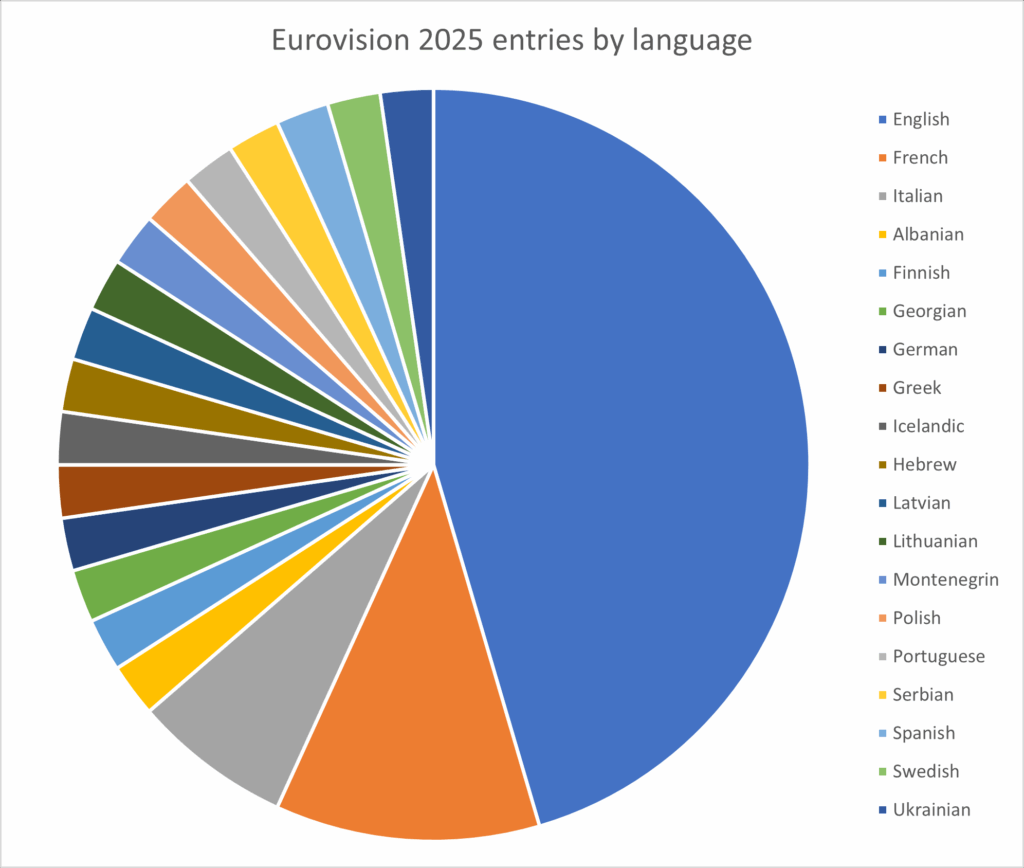
English is still the language we will hear most often, however, with 20 songs sung either wholly or partially in English. Second is French, with 5 countries (France, Luxembourg, Switzerland, Netherlands and Israel) opting to sing wholly or partially in French. In third place is Italian, with 3 countries‘ entries (Italy, San Marino and Estonia) featuring Italian.
How does this compare to previous years?
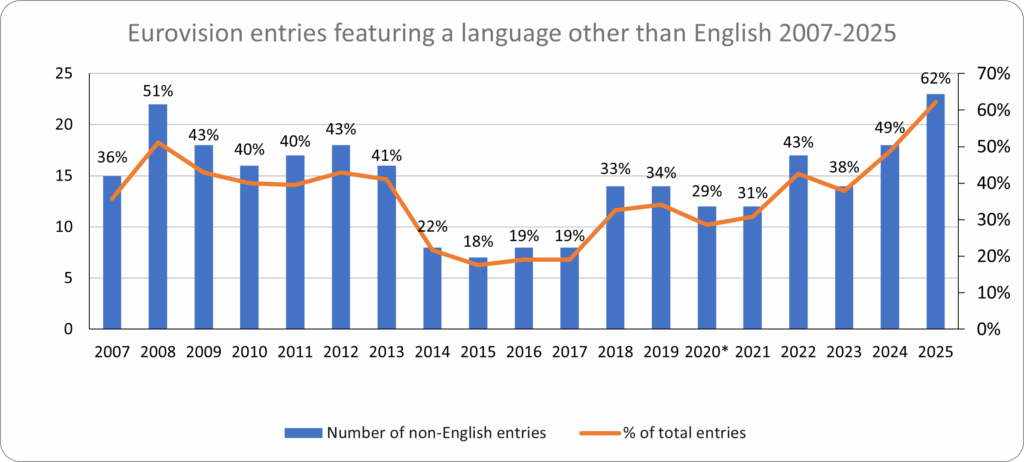
Let’s not beat around the bush: this contest has seen an explosion of entries in national languages. And I couldn’t be happier.
But what’s very interesting to me is that this trend doesn’t actually appear to be influenced by Eurovision winners. If you look at the sharp increases in languages in the past decades – 2008, 2018, 2022 – they can easily be attributed to a non-English-language winner the year before, but we haven’t had a non-English winner since 2022. More on this below.
Which languages are returning to Eurovision in 2025?
If you had told me last year that we’d see Germany and Sweden singing in German and Swedish respectively, I think I would have fallen off my chair. These two countries have arguably been the two that appeared most resistant to abandon English and yet 2025 will see them both do so!
German has been heard a handful of times at Eurovision in the past few years (see below), but we haven’t heard an entry entirely in German since Austria 2012. Germany’s last Beitrag in German was in 2007, a whopping 18 years ago.
Meanwhile, we last heard a Swedish entry at Eurovision in 2012, courtesy of Finland. But the last time Sweden entered in Swedish was way back in 1998, back when each country was forced obligated to sing in their national language – 27 years ago!
Simiarly, Latvia is serving up is first entirely Latvian-language entry since 2004 (although we heard a few one or two words in Latvian in 2023) and Georgian is returning to the Eurovision stage for the first time since 2019.
National languages at Eurovision in 2025: stats and trivia
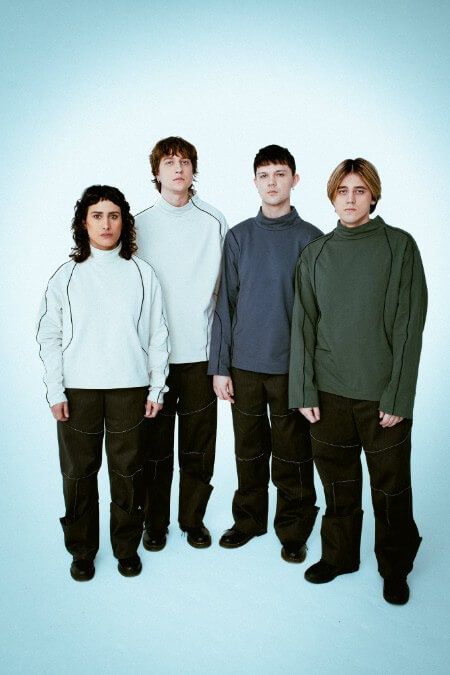
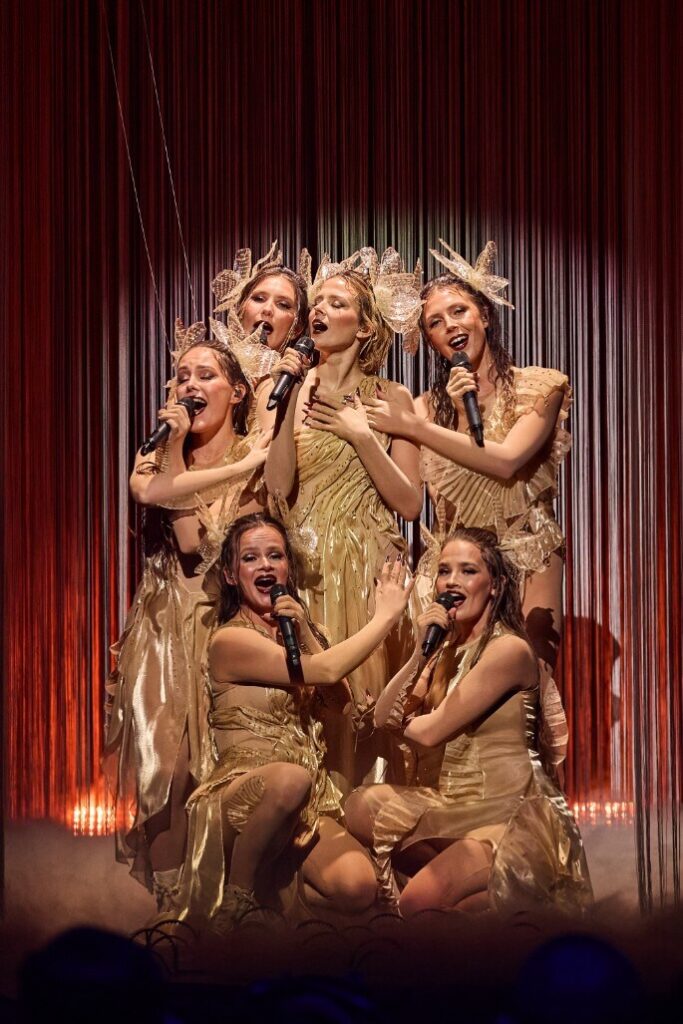
The Baltic Sea: a new hub for national languages?
A trend that has continued since last year is that the Baltics is again a hotbed of non-English entries; we’ll hear both Baltic languages as the mighty Lithuania is singing in Lithuanian for the third time in four years, and Latvia in Latvian. While Estonia is singing in… Italian (and English).
But this year, Baltic neighbours Poland, Finland and Sweden are also joining in on the trend.
In the past few years, the region that I most associated with national language entries was the Balkans, but with Croatia and Slovenia singing entirely in English this year – plus the absence of Moldova for the 2025 edition – it looks like the Baltic sea is the new hub. Hopefully this trend will continue!

Es kommt: the return of German
After years and years of waiting, Germany is finally singing in German again! This is something I have been waiting for for a very long time – my chosen home is finally sending something cool and sexy and in German.
But in a twist that somehow feels expected – Germany doesn’t have the coolest or sexiest song featuring German. That honour falls to Erika Vikman of Finland and her song, „Ich komme“ (I’m coming).


(The t-shirt on the right can be found here.)
While the song is actually almost entirely in Finnish, the title and refrain is German and the song is about… well, exactly what you think it’s about.
The reason this feels somewhat expected is that Germany often feels like the last country to actually think of German as a cool language or something that should be embraced on the Eurovision stage. The Netherlands used it in 2024, Georgia used it in 2020, Denmark sang a few lines of German in 2019, and even Ukraine’s aborted 2019 entry featured lines in German.
And even in 2025, the German entrants Abor & Tynna are actually… Austrians of Hungarian origin. Tja.
Finland vs. Sweden Finland
We now move over to Sweden, which – just like Germany – will fiiiiiiiiiiiiinally embrace its own language again in Basel. And just like Germany, it’s thanks to participants from a neighbouring country. And just like Germany, Finland is somehow involved…?
That’s right, Sweden will be represented by the Finnish band KAJ, singing in Swedish. KAJ hail from Ostrobothnia, a region of Finland where Swedish is still spoken by the majority of inhabitants. Their entry, Bara Bada Bastu, is sung almost entirely in Swedish with a few words of Finnish thrown in for good measure.
This means that while Finland is one of the favourites to win Eurovision 2025, Finland’s toughest competition might come from… Finland.

How likely is it we’ll see a non-English winner at Eurovision 2025?
According to the odds: pretty likely! At the time of writing (18 April), the top 5 countries with the best odds of winning are: Sweden, Austria, France, Israel and Netherlands. Of these five, only Austria is performed entirely in English. Interestingly enough, three of the five feature French.
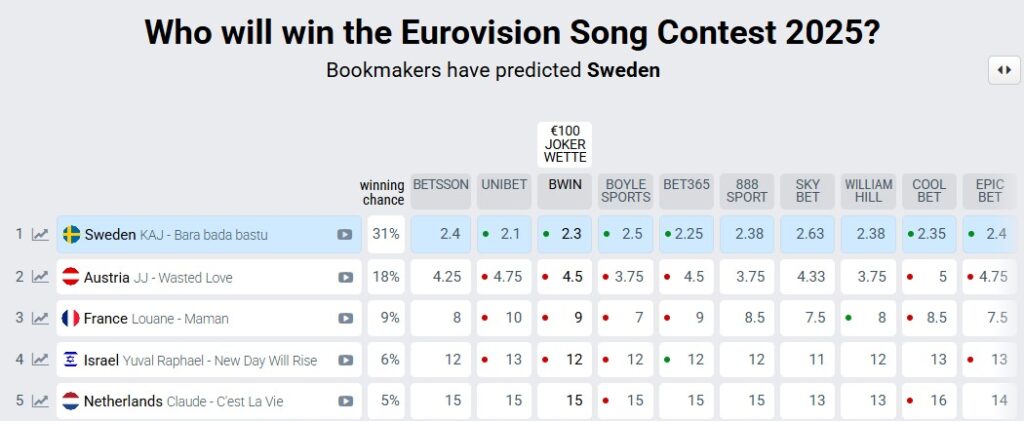
Of course, odds change. (For example, on publishing this post last year, eventual winner Switzerland was only 4th in the odds.) But with the majority of entries this year sung partially or wholly in a language other than English, I think we all have a reason to be hopeful.
My personal favourites this year are Finland, Sweden and Albania, so I will be keeping my sormet, fingrar and gishtat crossed on 17 May!
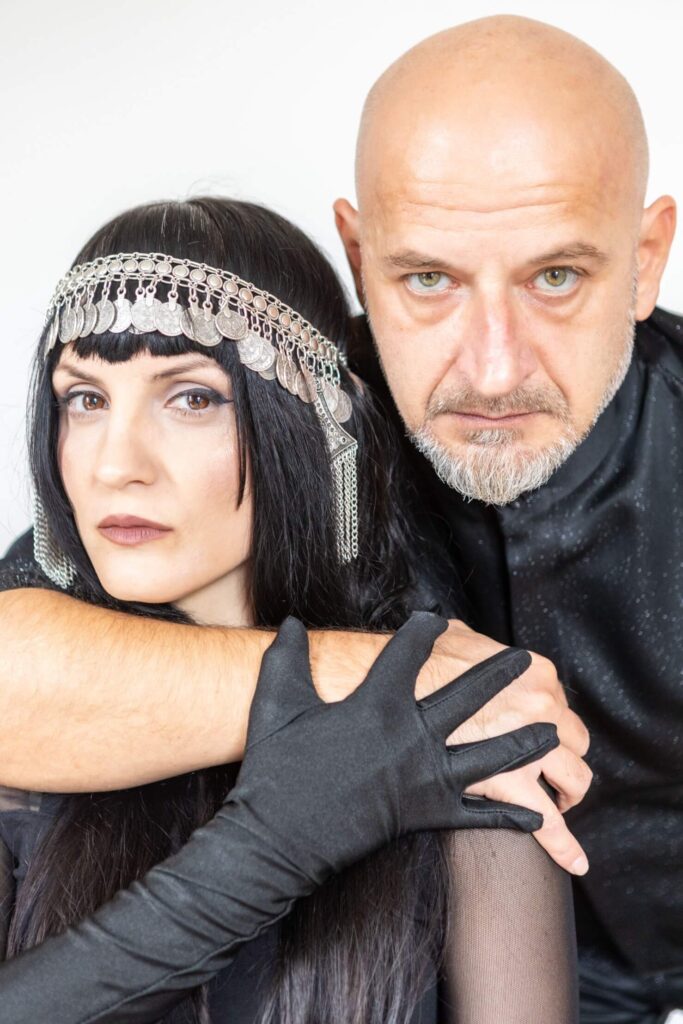

Looking ahead: can we expect more foreign languages at Eurovision 2026 and beyond?
Honestly, I really think so. As I mentioned earlier, previous upticks in foreign language entries came immediately on the heels of non-English winners, as in 2008, 2018 and 2022. However, the past two winning entries were both performed in English and yet the proportion continues to climb.
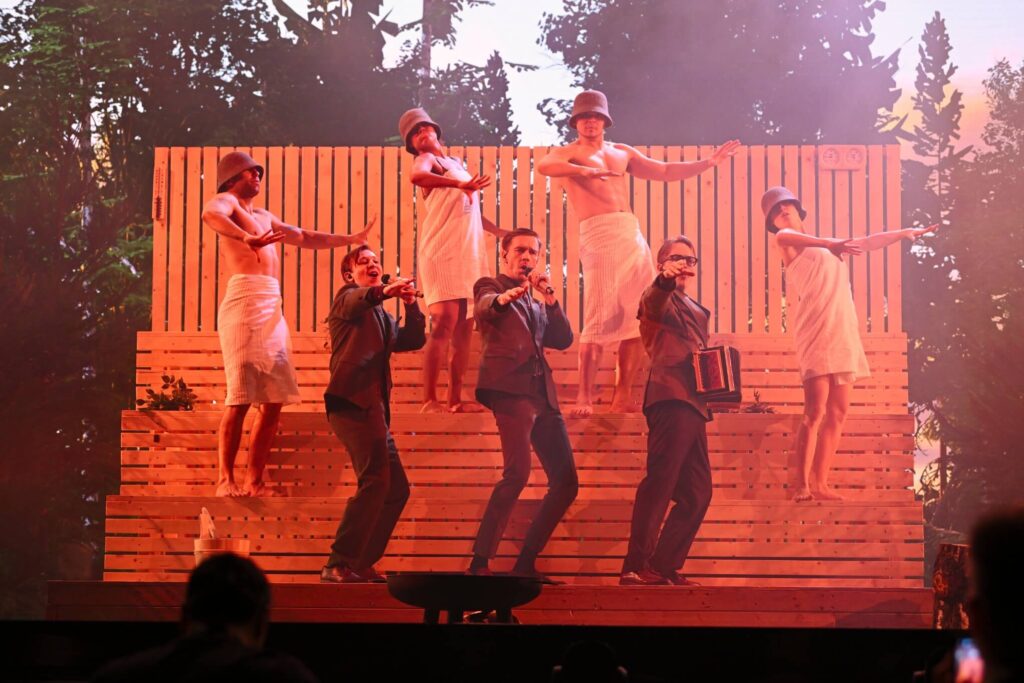
Of course, we can observe that the top 5 or top 10 in the most recent contests has not been dominated by English-language songs as was typical in the past, but I suspect another trend is behind this upward movement: more and more broadcasters tapping into local talent and market trends, rather than looking for “a song for Eurovision.“ This is something that I’ve observed at national finals across the continent this year and discussed on Reddit – especially in relation to countries like Finland and Lithuania.
Put quite simply, it seems that pre-Eurovision selection shows are opting for more and more local-language entries, because that is what people want to listen to. Rather than an artificial English language dance bop that doesn’t reflect the local music scene (no offence, Cyprus.)
But honestly I think this is a topic that deserves its own blog post (once I actually get chance to sit down and write it…), so for now I will simply say: I think we have every reason to be optimistic as we look to Basel in May and beyond.


I am absolutely stoked about the native-language renaissance that’s currently going on in Eurovision, and you have a good point that it’ll probably keep going for many years to come. Personally, I think the renaissance can be attributed at least in part to “Cha Cha Cha” from 2023, because by this point it’s safely one of *the* Eurovision songs. Now for the three countries who are breaking their longest no-native-language streaks, there’s a good reason why for each.
For Latvia, the reason is simplest: I think they felt left out in 2024 after both the other Baltics sent native-language songs. So in 2025, they put together a national final with almost half the songs in Latvian, which is much unlike their past selections. Since the juries and televote mostly consist of Latvians (and people with Latvian phone numbers), it’s no wonder that one of the native-language songs won in the end.
With Germany it’s a little trickier, because the national final was still dominated by songs in English. Even Abor and Tynna, whose discography is almost all in German, were going to send an English-language song to Chefsache ESC 2025, but Stefan Raab convinced them to send a song in German instead, and because Stefan Raab has a personality cult in Germany, they did exactly what he said. I think that Raab wanted Abor and Tynna to win Chefsache this entire time, and thus kept changing the rules last-minute so that they would win. He denies that he changed the rules amidst the show, but if that’s true, then the broadcaster did an awful job at communicating that. Whether the national final is rigged or not, it is a dream come true for me that Germany is sending a native-language song and I have high hopes for their entry, because it’s a widely appealing song among the youth and actually stands out among the song lineup, unlike the last few Erman entries which usually blended in. Let’s just pray Tynna doesn’t get sick again…
And finally we reach Sweden. In 2002, Melodifestivalen abolished the language rule and allowed songs in any language to compete, and expanded the show from one final to four heats, a second chance round, and then a final. Every year from 2002 to 2025, at least one Swedish-language song did manage to reach the Melfest final, but if there was a big fan favorite entry sung in Swedish, the juries would always prevent it from winning (see “Håll om mig” from 2005). Even when a song in Swedish did win Melfest, as was the case in 2004 and 2006, SVT would dictate that the song be localized to English for Eurovision.
Now in the past decade of Melodifestivalen, it was usually just one or two songs in Swedish that would reach the final each year. They were generally more lighthearted songs than the pop soup in English, but none were quite good enough to triumph over them. Except in 2025, where KAJ managed to field out a fun, catchy, and memorable entry that the entire country could stand behind. That was the year where Sweden finally said no to overproduced jury-friendly pop and sent a song to Eurovision that’s just as big a fan favorite as “Cha Cha Cha”. “Bara bada bastu” is incredibly awesome and I hope it wins Eurovision 2025. Well, there are other songs that I wouldn’t mind winning (hello Albania), but they don’t stand quite as much a chance to win, so I can only hope they do well.
Some great points here – thanks for sharing! For sure I hope the trend continues and I think Cha Cha Cha probably did do a lot to show that non-English songs can still have mass appeal. I think Moldova 2022 and to a lesser-extent Armenia 2024 also showed that fan, colourful national language entries can land you in the top 10 with something memorable.